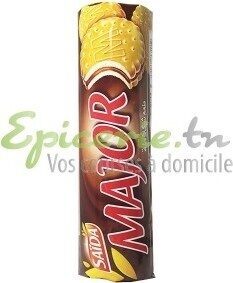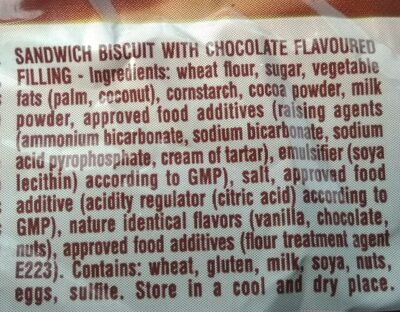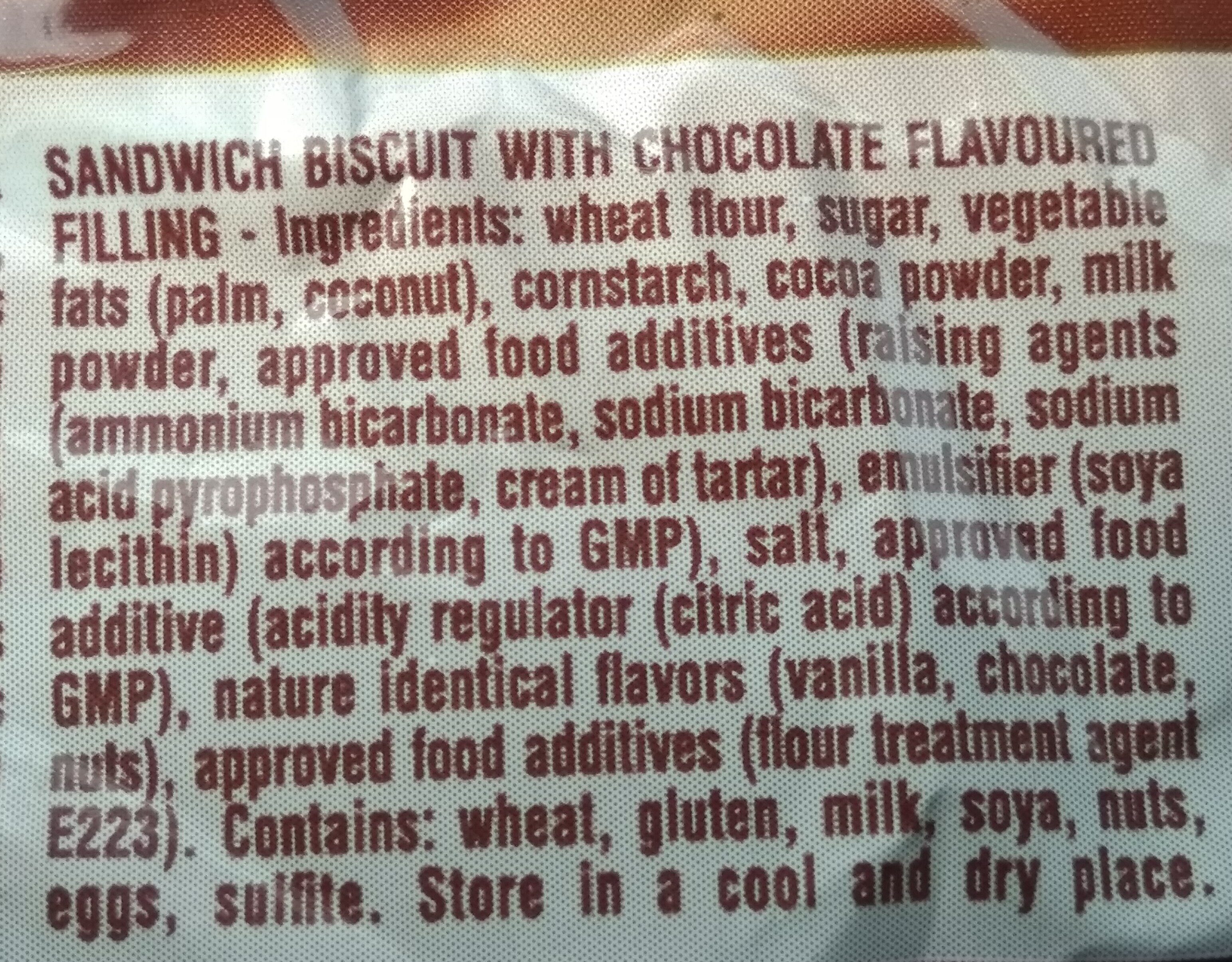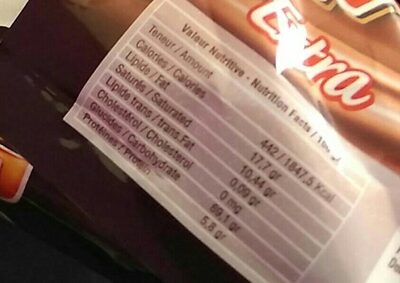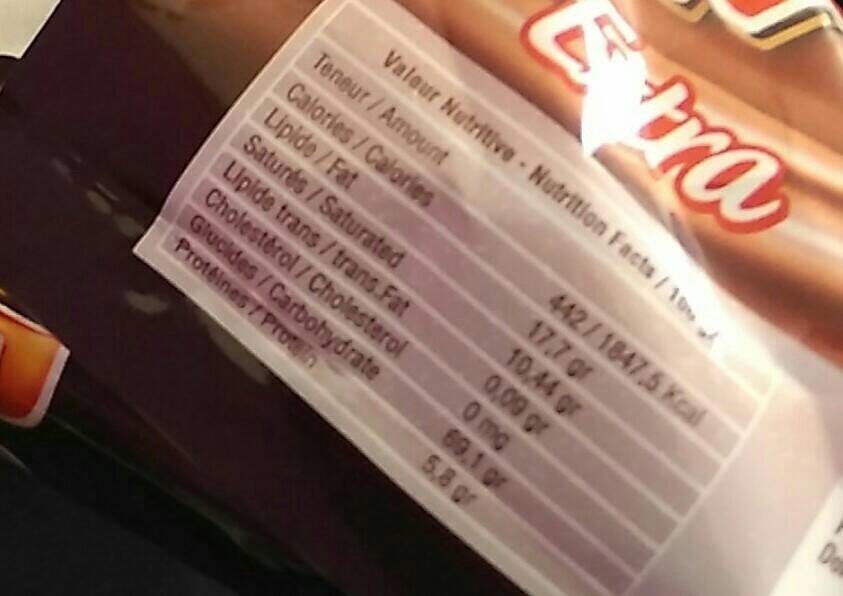Help us make food transparency the norm!
As a non-profit organization, we depend on your donations to continue informing consumers around the world about what they eat.
The food revolution starts with you!
MAJOR - Saïda - 180 g
MAJOR - Saïda - 180 g
This product page is not complete. You can help to complete it by editing it and adding more data from the photos we have, or by taking more photos using the app for Android or iPhone/iPad. Thank you!
×
Barcode: 6194008534019 (EAN / EAN-13)
Common name: Biscuit with chocolate flavored filling
Quantity: 180 g
Brands: Saïda
Categories: Snacks, Sweet snacks, Biscuits and cakes, Biscuits, Cakes, Filled biscuits
Origin of the product and/or its ingredients: Made in Tunisia
Manufacturing or processing places: Tunisie
Matching with your preferences
Health
Ingredients
-
31 ingredients
Wheat flour, sugar, vegetable fats (palm, coconut), cornstarch, cocoa powder, milk powder, approved food additives (raising agents ammonium bicarbonate, sodium bicarbonate, sodium acid pyrophosphate, cream of tartar), emulsifier (soya lecithin) according to GMP), salt, approved food additive (acidity regulator (citric acid) according to GMP), nature identical flavors (vanilla, chocolate, nuts), approved food additives (flour treatment agent E223). Contains: wheat, gluten, milk, soya, nuts, eggs, sulfite.Allergens: Gluten, Milk, Nuts, Soybeans, Sulphur dioxide and sulphites
Food processing
-
Ultra processed foods
Elements that indicate the product is in the 4 - Ultra processed food and drink products group:
- Additive: E322 - Lecithins
- Additive: E450 - Diphosphates
- Ingredient: Flavouring
Food products are classified into 4 groups according to their degree of processing:
- Unprocessed or minimally processed foods
- Processed culinary ingredients
- Processed foods
- Ultra processed foods
The determination of the group is based on the category of the product and on the ingredients it contains.
Additives
-
E223 - Sodium metabisulphite
Sodium metabisulfite: Sodium metabisulfite or sodium pyrosulfite -IUPAC spelling; Br. E. sodium metabisulphite or sodium pyrosulphite- is an inorganic compound of chemical formula Na2S2O5. The substance is sometimes referred to as disodium metabisulfite. It is used as a disinfectant, antioxidant, and preservative agent.Source: Wikipedia
-
E322 - Lecithins
Lecithins are natural compounds commonly used in the food industry as emulsifiers and stabilizers.
Extracted from sources like soybeans and eggs, lecithins consist of phospholipids that enhance the mixing of oil and water, ensuring smooth textures in various products like chocolates, dressings, and baked goods.
They do not present any known health risks.
-
E322i - Lecithin
Lecithins are natural compounds commonly used in the food industry as emulsifiers and stabilizers.
Extracted from sources like soybeans and eggs, lecithins consist of phospholipids that enhance the mixing of oil and water, ensuring smooth textures in various products like chocolates, dressings, and baked goods.
They do not present any known health risks.
-
E330 - Citric acid
Citric acid is a natural organic acid found in citrus fruits such as lemons, oranges, and limes.
It is widely used in the food industry as a flavor enhancer, acidulant, and preservative due to its tart and refreshing taste.
Citric acid is safe for consumption when used in moderation and is considered a generally recognized as safe (GRAS) food additive by regulatory agencies worldwide.
-
E336 - Potassium tartrates
Potassium tartrate: Potassium tartrate, dipotassium tartrate or argol has formula K2C4H4O6. It is the potassium salt of tartaric acid. It is often confused with potassium bitartrate, also known as cream of tartar. As a food additive, it shares the E number E336 with potassium bitartrate.Source: Wikipedia
-
E450 - Diphosphates
Diphosphates (E450) are food additives often utilized to modify the texture of products, acting as leavening agents in baking and preventing the coagulation of canned food.
These salts can stabilize whipped cream and are also found in powdered products to maintain their flow properties. They are commonly present in baked goods, processed meats, and soft drinks.
Derived from phosphoric acid, they're part of our daily phosphate intake, which often surpasses recommended levels due to the prevalence of phosphates in processed foods and drinks.
Excessive phosphate consumption is linked to health issues, such as impaired kidney function and weakened bone health. Though diphosphates are generally regarded as safe when consumed within established acceptable daily intakes, it's imperative to monitor overall phosphate consumption to maintain optimal health.
-
E500 - Sodium carbonates
Sodium carbonates (E500) are compounds commonly used in food preparation as leavening agents, helping baked goods rise by releasing carbon dioxide when they interact with acids.
Often found in baking soda, they regulate the pH of food, preventing it from becoming too acidic or too alkaline. In the culinary world, sodium carbonates can also enhance the texture and structure of foods, such as noodles, by modifying the gluten network.
Generally recognized as safe, sodium carbonates are non-toxic when consumed in typical amounts found in food.
-
E500ii - Sodium hydrogen carbonate
Sodium hydrogen carbonate, also known as E500ii, is a food additive commonly used as a leavening agent.
When added to recipes, it releases carbon dioxide gas upon exposure to heat or acids, causing dough to rise and resulting in a light, fluffy texture in baked goods.
It is generally recognized as safe (GRAS) by regulatory authorities when used in appropriate quantities and poses no significant health risks when consumed in typical food applications.
-
E503 - Ammonium carbonates
Ammonium carbonate: Ammonium carbonate is a salt with the chemical formula -NH4-2CO3. Since it readily degrades to gaseous ammonia and carbon dioxide upon heating, it is used as a leavening agent and also as smelling salt. It is also known as baker's ammonia and was a predecessor to the more modern leavening agents baking soda and baking powder. It is a component of what was formerly known as sal volatile and salt of hartshorn.Source: Wikipedia
-
E503ii - Ammonium hydrogen carbonate
Ammonium carbonate: Ammonium carbonate is a salt with the chemical formula -NH4-2CO3. Since it readily degrades to gaseous ammonia and carbon dioxide upon heating, it is used as a leavening agent and also as smelling salt. It is also known as baker's ammonia and was a predecessor to the more modern leavening agents baking soda and baking powder. It is a component of what was formerly known as sal volatile and salt of hartshorn.Source: Wikipedia
Ingredients analysis
-
Palm oil
Ingredients that contain palm oil: Palm
-
Non-vegan
Non-vegan ingredients: Milk powderSome ingredients could not be recognized.
We need your help!
You can help us recognize more ingredients and better analyze the list of ingredients for this product and others:
- Edit this product page to correct spelling mistakes in the ingredients list, and/or to remove ingredients in other languages and sentences that are not related to the ingredients.
- Add new entries, synonyms or translations to our multilingual lists of ingredients, ingredient processing methods, and labels.
If you would like to help, join the #ingredients channel on our Slack discussion space and/or learn about ingredients analysis on our wiki. Thank you!
-
Vegetarian status unknown
Unrecognized ingredients: fr:additifs-alimentaires-autorises, fr:agents-de-levee, fr:emulsifant, fr:selon-bpf, fr:additif-alimentaire-autorise, fr:selon-bpf, fr:additifs-alimentaires-autorises, fr:eufs, SulfiteSome ingredients could not be recognized.
We need your help!
You can help us recognize more ingredients and better analyze the list of ingredients for this product and others:
- Edit this product page to correct spelling mistakes in the ingredients list, and/or to remove ingredients in other languages and sentences that are not related to the ingredients.
- Add new entries, synonyms or translations to our multilingual lists of ingredients, ingredient processing methods, and labels.
If you would like to help, join the #ingredients channel on our Slack discussion space and/or learn about ingredients analysis on our wiki. Thank you!
-
Details of the analysis of the ingredients
We need your help!
Some ingredients could not be recognized.
We need your help!
You can help us recognize more ingredients and better analyze the list of ingredients for this product and others:
- Edit this product page to correct spelling mistakes in the ingredients list, and/or to remove ingredients in other languages and sentences that are not related to the ingredients.
- Add new entries, synonyms or translations to our multilingual lists of ingredients, ingredient processing methods, and labels.
If you would like to help, join the #ingredients channel on our Slack discussion space and/or learn about ingredients analysis on our wiki. Thank you!
: Farine de blé, sucre, graisses végétales (palme, coprah), amidon de mais, cacao en poudre, lait en poudre, additifs alimentaires autorisés (agents de levée (bicarbonate d'ammonium, bicarbonate de sodium, pyrophosphate acide de sodium, crème de tartre), émulsifant (lécithine de soja), selon BPF), sel, additif alimentaire autorisé (correcteur d'acidité (acide citrique), selon BPF), arômes identiques nature (vanille, chocolat, noisette), additifs alimentaires autorisés (agents de traitement de la farine (e223)), eufs, sulfites- Farine de blé -> en:wheat-flour - vegan: yes - vegetarian: yes - ciqual_proxy_food_code: 9410 - percent_min: 7.69230769230769 - percent_max: 100
- sucre -> en:sugar - vegan: yes - vegetarian: yes - ciqual_proxy_food_code: 31016 - percent_min: 0 - percent_max: 50
- graisses végétales -> en:vegetable-fat - vegan: yes - vegetarian: yes - from_palm_oil: maybe - percent_min: 0 - percent_max: 33.3333333333333
- palme -> en:palm - vegan: yes - vegetarian: yes - from_palm_oil: yes - ciqual_food_code: 16129 - percent_min: 0 - percent_max: 33.3333333333333
- coprah -> en:coconut-oil - vegan: yes - vegetarian: yes - from_palm_oil: no - ciqual_food_code: 16040 - percent_min: 0 - percent_max: 16.6666666666667
- amidon de mais -> en:corn-starch - vegan: yes - vegetarian: yes - ciqual_food_code: 9510 - percent_min: 0 - percent_max: 25
- cacao en poudre -> en:cocoa-powder - vegan: yes - vegetarian: yes - ciqual_food_code: 18100 - percent_min: 0 - percent_max: 20
- lait en poudre -> en:milk-powder - vegan: no - vegetarian: yes - ciqual_proxy_food_code: 19044 - percent_min: 0 - percent_max: 16.6666666666667
- additifs alimentaires autorisés -> fr:additifs-alimentaires-autorises - percent_min: 0 - percent_max: 14.2857142857143
- agents de levée -> fr:agents-de-levee - percent_min: 0 - percent_max: 14.2857142857143
- bicarbonate d'ammonium -> en:e503ii - vegan: yes - vegetarian: yes - percent_min: 0 - percent_max: 14.2857142857143
- bicarbonate de sodium -> en:e500ii - vegan: yes - vegetarian: yes - percent_min: 0 - percent_max: 7.14285714285714
- pyrophosphate acide de sodium -> en:e450i - vegan: yes - vegetarian: yes - percent_min: 0 - percent_max: 4.76190476190476
- crème de tartre -> en:e336 - vegan: yes - vegetarian: yes - percent_min: 0 - percent_max: 3.57142857142857
- émulsifant -> fr:emulsifant - percent_min: 0 - percent_max: 7.14285714285714
- lécithine de soja -> en:soya-lecithin - vegan: yes - vegetarian: yes - ciqual_food_code: 42200 - percent_min: 0 - percent_max: 7.14285714285714
- selon BPF -> fr:selon-bpf - percent_min: 0 - percent_max: 4.76190476190476
- agents de levée -> fr:agents-de-levee - percent_min: 0 - percent_max: 14.2857142857143
- sel -> en:salt - vegan: yes - vegetarian: yes - ciqual_food_code: 11058 - percent_min: 0 - percent_max: 12.5
- additif alimentaire autorisé -> fr:additif-alimentaire-autorise - percent_min: 0 - percent_max: 11.1111111111111
- correcteur d'acidité -> en:acidity-regulator - percent_min: 0 - percent_max: 11.1111111111111
- acide citrique -> en:e330 - vegan: yes - vegetarian: yes - percent_min: 0 - percent_max: 11.1111111111111
- selon BPF -> fr:selon-bpf - percent_min: 0 - percent_max: 5.55555555555556
- correcteur d'acidité -> en:acidity-regulator - percent_min: 0 - percent_max: 11.1111111111111
- arômes identiques nature -> fr:arome-identique-nature - vegan: maybe - vegetarian: maybe - percent_min: 0 - percent_max: 5
- vanille -> en:vanilla - vegan: yes - vegetarian: yes - percent_min: 0 - percent_max: 5
- chocolat -> en:chocolate - vegan: maybe - vegetarian: yes - percent_min: 0 - percent_max: 2.5
- noisette -> en:hazelnut - vegan: yes - vegetarian: yes - ciqual_food_code: 15004 - percent_min: 0 - percent_max: 1.66666666666667
- additifs alimentaires autorisés -> fr:additifs-alimentaires-autorises - percent_min: 0 - percent_max: 5
- agents de traitement de la farine -> en:flour-treatment-agent - percent_min: 0 - percent_max: 5
- e223 -> en:e223 - vegan: yes - vegetarian: yes - percent_min: 0 - percent_max: 5
- agents de traitement de la farine -> en:flour-treatment-agent - percent_min: 0 - percent_max: 5
- eufs -> fr:eufs - percent_min: 0 - percent_max: 5
- sulfites -> en:sulfite - percent_min: 0 - percent_max: 5
Nutrition
-
Missing data to compute the Nutri-Score
Missing nutrition facts
⚠ ️The nutrition facts of the product must be specified in order to compute the Nutri-Score.Could you add the information needed to compute the Nutri-Score? Add nutrition facts
-
Nutrient levels
-
Fat in moderate quantity (17.7%)
What you need to know- A high consumption of fat, especially saturated fats, can raise cholesterol, which increases the risk of heart diseases.
Recommendation: Limit the consumption of fat and saturated fat- Choose products with lower fat and saturated fat content.
-
Saturated fat in high quantity (10.4%)
What you need to know- A high consumption of fat, especially saturated fats, can raise cholesterol, which increases the risk of heart diseases.
Recommendation: Limit the consumption of fat and saturated fat- Choose products with lower fat and saturated fat content.
-
-
Nutrition facts
Nutrition facts As sold
for 100 g / 100 mlCompared to: Filled biscuits Energy 1,847.5 kj
(442 kcal)-6% Fat 17.7 g -9% Saturated fat 10.44 g +24% Trans fat 0 g -100% Cholesterol 0 mg -100% Carbohydrates 69.1 g +4% Sugars ? Fiber ? Proteins 5.8 g +3% Salt ? Fruits‚ vegetables‚ nuts and rapeseed‚ walnut and olive oils (estimate from ingredients list analysis) 0.023 %
Environment
-
Eco-Score D - High environmental impact
⚠ ️Select a country in order to include the full impact of transportation.The Eco-Score is an experimental score that summarizes the environmental impacts of food products.→ The Eco-Score was initially developped for France and it is being extended to other European countries. The Eco-Score formula is subject to change as it is regularly improved to make it more precise and better suited to each country.Life cycle analysis
-
Average impact of products of the same category: B (Score: 69/100)
Category: Biscuit (cookie)
Category: Biscuit (cookie)
- PEF environmental score: 0.35 (the lower the score, the lower the impact)
- including impact on climate change: 2.88 kg CO2 eq/kg of product
Stage Impact Agriculture
80.5 %Processing
11.8 %Packaging
3.1 %Transportation
3.2 %Distribution
1.4 %Consumption
0.0 %
Bonuses and maluses
-
Missing origins of ingredients information
Malus: -5
⚠ ️ The origins of the ingredients of this product are not indicated.
If they are indicated on the packaging, you can modify the product sheet and add them.
If you are the manufacturer of this product, you can send us the information with our free platform for producers.
-
Ingredients that threatens species
Malus: -10
Contains palm oil
Tropical forests in Asia, Africa and Latin America are destroyed to create and expand oil palm tree plantations. The deforestation contributes to climate change, and it endangers species such as the orangutan, the pigmy elephant and the Sumatran rhino.
-
Missing packaging information for this product
Malus: -15
⚠ ️ The information about the packaging of this product is not filled in.⚠ ️ For a more precise calculation of the Eco-Score, you can modify the product page and add them.
If you are the manufacturer of this product, you can send us the information with our free platform for producers.
Eco-Score for this product
-
Impact for this product: D (Score: 39/100)
Product: MAJOR - Saïda - 180 g
Life cycle analysis score: 69
Sum of bonuses and maluses: -30
Final score: 39/100
-
Carbon footprint
-
Equal to driving 1.5 km in a petrol car
288 g CO² per 100g of product
The carbon emission figure comes from ADEME's Agribalyse database, for the category: Biscuit (cookie) (Source: ADEME Agribalyse Database)
Stage Impact Agriculture
82.9 %Processing
7.9 %Packaging
3.8 %Transportation
4.7 %Distribution
0.7 %Consumption
0.0 %
Packaging
-
Missing packaging information for this product
⚠ ️ The information about the packaging of this product is not filled in.Take a photo of the recycling information Take a photo of the recycling information
Transportation
-
Origins of ingredients
Missing origins of ingredients information
⚠ ️ The origins of the ingredients of this product are not indicated.
If they are indicated on the packaging, you can modify the product sheet and add them.
If you are the manufacturer of this product, you can send us the information with our free platform for producers.Add the origins of ingredients for this product Add the origins of ingredients for this product
Threatened species
-
Contains palm oil
Drives deforestation and threatens species such as the orangutan
Tropical forests in Asia, Africa and Latin America are destroyed to create and expand oil palm tree plantations. The deforestation contributes to climate change, and it endangers species such as the orangutan, the pigmy elephant and the Sumatran rhino.
Report a problem
-
Incomplete or incorrect information?
Category, labels, ingredients, allergens, nutritional information, photos etc.
If the information does not match the information on the packaging, please complete or correct it. Open Food Facts is a collaborative database, and every contribution is useful for all.
Data sources
Product added on by kiliweb
Last edit of product page on by segundo.
Product page also edited by ecoscore-impact-estimator, gmlaa, nadamanaa, openchris, openfoodfacts-contributors, teolemon, yuka.JqxcGY7TM9InOcHA9dgowzLrPvvqP_NeFF4jow, yuka.Ull3cU1vMFRyZmtsaHNjYzRCTE14ZElsbHJtMkJVQytldkpOSVE9PQ, yuka.sY2b0xO6T85zoF3NwEKvlnUcDOHRhgP_NyfRulOBz4aNAbPRaPIrvpKnMqg.
